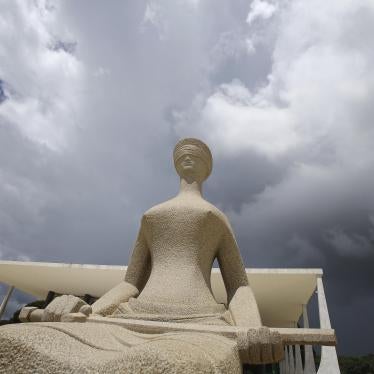Dear Mr. Cormann,
We, the undersigned organizations, who bring together extensive experience in monitoring policies on transparency, good governance, human rights, and the promotion of sustainable development in Brazil, are writing to express our concerns regarding the initiation of formal discussions for the country's accession to the Organisation for Economic Co-operation and Development (OECD), formalized in a correspondence dated 25 January 2022, and to request a meeting with you to discuss the possibilities for civil society input in the construction of the accession roadmap by the OECD Secretariat.
In our view, Brazil’s inclusion in multilateral bodies such as the OECD can benefit the country. We believe that the adoption of good practices in several areas of public policy and the strengthening of the rule of law, as promoted by the OECD, could help Brazil to improve not only its economic performance, but also the promotion of human rights and good environmental and climate governance.
These objectives, however, will only be achieved if the country, encouraged by the accession process, not only commits itself, but also effectively demonstrates the will and capacity to implement, on a permanent basis, the good practices and policies recommended by the OECD. Yet in recent years – and especially since President Jair Bolsonaro came to power – we have seen a backsliding in Brazil on the practices and policies that are crucial for human rights, transparency, good governance, the reduction of greenhouse gas emissions, and the strengthening of democracy and the rule of law.
For this reason, we are concerned that the invitation for Brazil could send the wrong message that the OECD endorses these harmful policies and actions, which have taken a dramatic toll on multiple fronts – including leading to the highest annual deforestation of the Amazon Rainforest in the past 15 years[1]; unprecedented setbacks in transparency and the fight against corruption (which prompted a high-level mission[2] and other measures[3] by the OECD Working Group on Bribery to verify the country’s situation); a 138 percent increase in cases of invasion of indigenous lands[4]; a drop of nine positions in the country’s international ranking on press freedom[5]; and the highest number of land conflicts since 1985[6]. These and other setbacks have impacted critical areas that are prioritized in the guidelines for OECD expansion, including the Noburu Report[7] and the “Resolution of the Council on the Opening of Accession Discussions”[8], which specifically addresses the accession process for Brazil, Argentina, Bulgaria, Croatia, Peru and Romania.
In its vision for the next decade, the OECD has committed itself to act at the “vanguard of modern management practices, transparency and accountability.”[9] This commitment should extend to the accession process for new members to the organization, given that, according to the “Framework for the Consideration of Prospective Members,” the decision to start formal accession discussions must be guided by, among other things, evidence of the commitment by the prospective member to the organization’s core values[10].
With this goal in mind, we believe it is crucially important that the accession process for Brazil and other countries be transparent and open. In particular, we believe that there should be a formal processes established to allow civil society input in the construction of the roadmap, the independent assessment of compliance with policies recommended by the OECD, and the formulation of action plans. Such participation is critical to ensure that an eventual accession will not signify a seal of approval of practices that are incompatible with the OECD’s own guidelines, but rather an opportunity for the effective improvement of public policies towards sustainable and equitable development.
We would very much appreciate the opportunity to elaborate on our concerns regarding the Brazilian situation and explore possibilities for civil society input in the country's accession process. With that aim, we would like to request a meeting with you via video conference at your earliest convenience.
Thank you for your attention to our concerns.
Yours sincerely,
[2] Law enforcement capacity in Brazil to investigate and prosecute foreign bribery seriously threatened, says OECD Working Group on Bribery
[3] OECD Working Group on Bribery Statement “Brazil must immediately end threats to independence and capacity of law enforcement to fight corruption” (November 2019); OECD Working Group on Bribery Plenary Meeting Public Summary Record (December, 2020).
[4] Desmatamento em Terras Indígenas cresceu 138% nos últimos três anos | ISA - Instituto Socioambiental
[6] https://www.cptnacional.org.br/downlods/summary/41-conflitos-no-campo-brasil-publicacao/14242-conflitos-no-campo-brasil-2020







